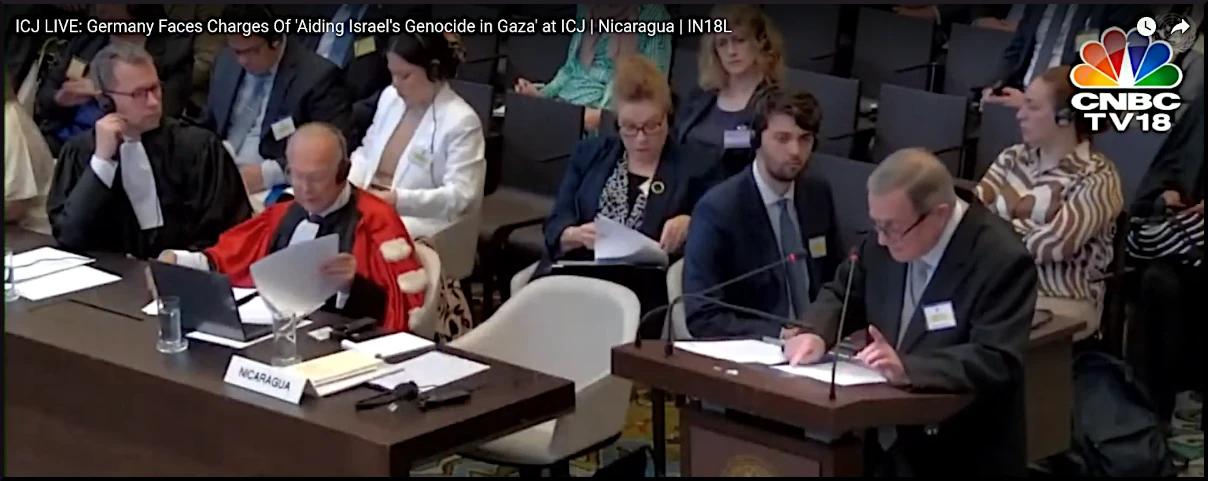by John Perry, published on AFGJ:NicaNotes, April 25, 2024
Nicaragua’s complaint at the ICJ against Germany for complicity in Genocide is a constructive follow-on to the earlier case brought by South Africa against Israel for committing Genocide in Palestine. Neither will have a final resolution any time soon, but when the time comes, Germany will be on the docket with Israel thanks to the initiative and aplomb of a small Central American country routinely abused by its overbearing neighbor to the north. [jb]
On April 11, Dr Ghassan Abu-Sittah, the British-Palestinian war surgeon, gave his first address as the newly-appointed rector of Glasgow University, chosen in recognition of his work at al-Shifa hospital in Gaza. The following day he flew to Berlin, where he had been invited to address a major conference on Palestine. On arrival he was taken away by police, interrogated for several hours and eventually told he had to leave Germany and wouldn’t be allowed to return until at least the end of April. Any attempt to speak to the conference via Zoom could result in a fine or even a year’s prison sentence. By the time he was released he couldn’t have taken part in the conference anyway, since it had been invaded by at least 900 police and closed down. Berlin’s mayor said that it was ‘intolerable’ that the conference was taking place at all.
Speaking about his experience afterwards, Dr Abu-Sittah referred to the fact that Germany had – also last week – been defending itself at the International Court of Justice against charges by Nicaragua that it is an accomplice to genocidal war. ‘This is exactly what accomplices to a crime do,’ he said. ‘They bury the evidence and they silence or harass or intimidate the witnesses.’
Watching the live feed of Germany’s lawyers at the Hague a few days earlier had been an odd experience. They gave the impression of feeling affronted that Germany had been accused of such crimes, especially by a small country which, they argued, had no stake in the case. Also, Israel could not yet be said to be committing genocide, because the ICJ has not yet determined the case brought against it by South Africa, which Germany had supported Israel in contesting. Because Israel was not party to the new case, it should simply be thrown out.
Some research might have given them a better appreciation of Nicaragua’s credentials to bring the case. Its mutual solidarity with Palestine goes back a long way. It also has more experience at the Hague than Germany, including its pioneer action against the US in 1984, when it won the case and an order for compensation later calculated to amount to £17 billion (that was never paid) for the damage done to Nicaragua by the US-funded Contra war and the mining of its ports. Carlos Argüello, who led the case last week and many of its previous cases (including the case in the 1980s), said that Nicaragua offered its expertise to Palestine and it had already joined in with South Africa’s action. It had decided to target Germany, the second biggest supplier of arms to Israel, because the US, the biggest supplier, is outside the court’s jurisdiction on this issue.
Argüello explains that the object is to create a precedent with wider application – that countries must take responsibility for the consequences of their arms sales to avoid them being used in breach of international law. Germany’s argument that legal action cannot proceed before South Africa’s earlier case is resolved is nonsense, since countries have an obligation to prevent genocide, not merely wait until it is proven to be happening. In any case, Germany must have been aware of the numerous warnings from senior UN officials of the imminence of genocide in Gaza, which began as early as October 9th.
Germany claimed that it has a “robust legal framework” in place to ensure its arms exports are not misused, and that sales to Israel are now restricted to non-lethal equipment. But any supplies being sent to a genocidal army are helping to sustain its criminal actions, Nicaragua replied.
Much was made of Germany’s historic obligations due to its Nazi history, but Argüello argues that these should relate to the Jewish people, not the Israeli state. He adds that Germany’s past might also oblige it to help prevent genocide wherever it might occur. Its government spokesman on the South Africa case had claimed that Germany is ‘particularly committed to the Genocide Convention’.
The economist Yanis Varoufakis was also banned from speaking in Berlin. He planned to conclude his speech by telling German politicians that ‘they have covered themselves in shame’ through their unflinching support for Israel’s atrocities. Carlos Argüello echoes this point when asked whether a decision by the ICJ can actually be enforced: We have to mobilize shame, he says, ‘…that’s the hope with this. Perhaps it’s being too idealistic, but it’s the only weapon we have’.
*Featured Image:from live coverage of Nicaragua’s presentation by CNBC-TV18
John Perry has written for The Nation, London Review of Books, Guardian, Council on Hemispheric Affairs, CounterPunch, Grayzone and other outlets. He is based in Masaya, Nicaragua.
